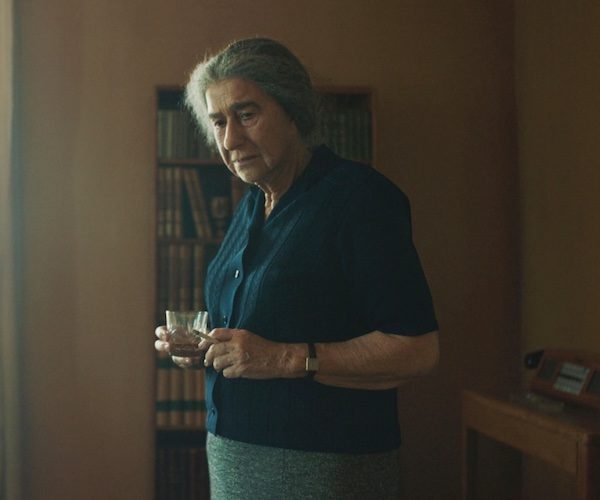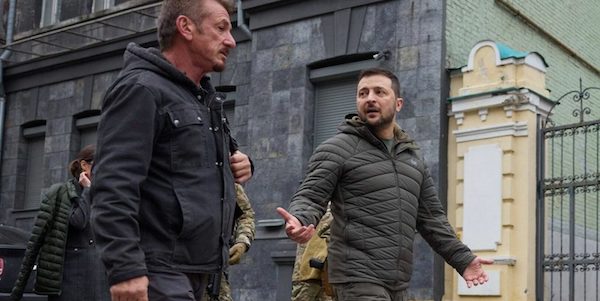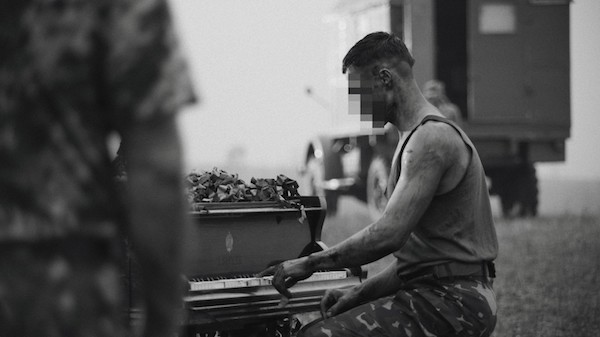Film Reviews: Golda and Sean at the Berlin International Film Festival
By David D’Arcy
This year’s Berlin International Film Festival launched a couple of films aimed at a mass audience. The results were mixed.

Helen Mirren as Golda Meir in the biopic Golda.
One much anticipated effort was Golda, a portrait of the Israeli politician Golda Meir, with Helen Mirren in the title role. The Israeli director Guy Nattiv focuses on Meir during the 1973 Yom Kippur War, a moment that continues to raise questions about her legacy. Critics charge that errors of judgment, made by her, led to a near-defeat and to hundreds of Israeli deaths that could have been avoided. Her admirers, and there are many in the US, see that war as a confirmation of her status as “the strongest man in the country.” We’re all lucky that Meir chose not to use nuclear weapons, a consideration at the time.
Most of the film takes place in the smoke-filled rooms of the Israeli high command, which was taken by surprise on October 6, 1973, when news arrived of attacks from Egypt, Syria, and Jordan. Golda serves up the glorious triumph of legend: how the country’s commanders — particularly Meir — reversed the potential rout and defeated the attackers. Mirren plays Meir as an imperturbable leader, surrounded by advisers Moshe Dayan (Rami Heuberger) and David “Dado” Elazar (Lior Ashkenazy). She consults very familiarly on the phone with Henry Kissinger, played by Liev Schreiber. The black-and-white film, set mostly in enclosed spaces, is given a weathered period look — thick swirls of cigarette smoke help set the tone. (Anne Bancroft, a nonsmoker who played Meir in a stage production on Broadway in 1977, smoked in every performance and became ill, forcing the cancellation of the show.)
Golda, with Mirren as the Israeli leader, gives us the same revered woman served up by conventional accounts of her life. She is a leader who, without frills or ceremony, saves her country in the worst of times. Echoing Meir’s American-accented English, Mirren gives terse orders amid barrages of smoke — even when the woman is undergoing intravenous chemotherapy. The problem is that the film’s atmosphere is stronger than its adulatory script. Yes, Meir was a persuasive and prodigious fundraiser; she could get much of what she wanted and what Israel needed from Americans. But we also know that she denied the existence of a Palestinian people and regularly scorned the emerging field of feminism. A more complex Meir — a woman who chose politics over her children and was notorious for the number of lovers she had while married — would have been welcome to mark the 50th anniversary of her becoming prime minister. As one writer pointed out in a review of several Meir biographies, too many people have too much at stake in upholding the Golda Meir myth. Golda was a missed opportunity to take a closer critical look.
For better or worse, there is another chance at seeing the real Meir on film. A television series based on the recent Meir biography, Francine Klagsbrun’s Lioness, is being produced by no less than Barbara Streisand. Shira Haas (Unorthodox) is reported to be heading the future cast. The director, Mimi Leder, also made On the Basis of Sex, an admiring bio-pic about Ruth Bader Ginsburg. It looks like the Meir myth will live on.

Film star Sean Penn and Ukrainian President Volodymyr Zelenskyy in a scene from the documentary Superpower. Photo: ZUMA Press
Another much-awaited premiere was Superpower, a documentary about the war in Ukraine directed by Sean Penn and Aaron Kaufman. Penn is on camera, in situ, talking about the war with President Volodymyr Zelenskyy (a fellow performer) and with Ukrainians you’ve never heard of, some of whom tell you things many of us won’t know. Penn, with soldiers and his crew, tours a damaged Kiev and ventures out toward the front lines. The film ends as Penn, who saw fictional combat in The Thin Red Line, gets the “ground truth” he sought and recognizes just how much murderous damage the Russian invasion has done to Ukraine so far.
The deadly threat to Ukraine is as great as ever, and the country needs every friend it can get, especially if the friend is a Hollywood celebrity who can attract audiences. Zelensky and company know that well, and are grateful to Penn for his support.
If there is a recurring image in Superpower, besides the ravaged Ukrainian landscape, it is Penn’s weathered face, stricken here by what he’s seeing and learning. In a film that tells its stories through conversation rather than reporting, the camera cuts away to Penn grimacing as if he’s the one who is battle-weary.
Still, you get the feeling that the only person learning anything in Superpower is Sean Penn. The German broadcaster Deutsche Welle called the film “The Idiot’s Guide to Ukraine.” If that’s the case, then Penn is taking his own tortured journey of discovery through what is now familiar territory to anyone with access to the internet. Who will show Superpower and who will watch it? It leaves this project in an odd predicament. Could this film, from a highly visible actor, find itself without viewers?

A scene from Iron Butterflies.
Another film from Ukraine in Berlin was Iron Butterflies, Roman Liubiy’s wryly satirical look back at the politics of the country’s war over the last decade. The point of departure here is the downing of a Malaysian Airlines flight over eastern Ukraine on July 17, 2014, killing all 298 aboard. The plane, targeted by pro-Russian separatists, was shot down (perhaps accidentally) by a Russian missile. One self-serving excuse is that a trigger-happy, and possibly drunken, missile crew didn’t know that they were shooting down a commercial airliner at more than 30,000 feet. The word issued by Moscow was that it was the work of the CIA. The evidence produced by a Dutch investigation of the flight that originated in Amsterdam pointed to Russia. Still, the official lies intensified. Liubiy serves up an odd — but persuasive — cocktail of heartfelt mourning interlaced with mockery of Moscow’s unceasing propaganda. Using dark humor that brings emotional relief won’t come as a surprise to audiences familiar with that part of the world. Liubiy constructs a comic collage around Russian aggression and the lies that attempt to justify it.
Iron Butterflies premiered at Sundance 2023. Look for it at film festivals.
David D’Arcy lives in New York. For years, he was a programmer for the Haifa International Film Festival in Israel. He writes about art for many publications, including the Art Newspaper. He produced and co-wrote the documentary Portrait of Wally (2012), about the fight over a Nazi-looted painting found at the Museum of Modern Art in Manhattan.
Tagged: David D'Arcy, Golda Meir, Guy Nattiv, Helen Mirren, Iron Butterflies, Sean Penn, Superpower

